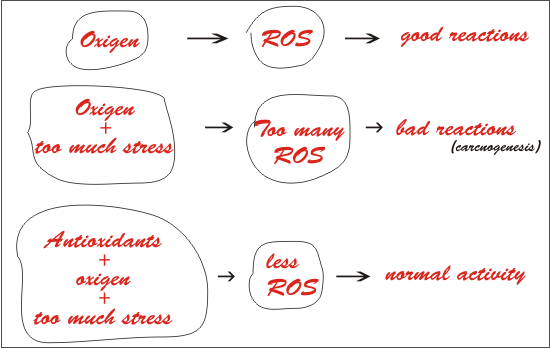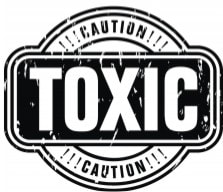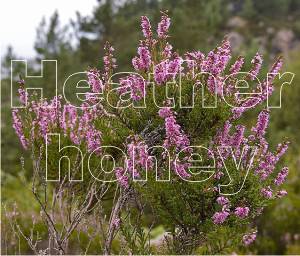Are antioxidants really good for us? Which are the best: from supplements or from food? Does honey have antioxidants? This article will cover all these and much more.
There is a whole new obsession with antioxidants. There are tons of supplements with antioxidants. Naturopathic doctors, as well as medical doctors, tell us to take antioxidants as our body needs them. I think my question here is quite legit: Why?
My grandmother did not take them, and she lived until the age of 102. Her mother didn’t take antioxidants and she reached 101! Why do we need antioxidants now?
Doctors will say that our stress level has increased a lot during the latest decades and so is the pollution. I agree with the pollution, but I don’t know about the stress. I mean, stress can be generated even by the smallest and most insignificant things. It’s only a matter of attitude as to how to handle it.
But if we consider the pollution and all radiation sources around us, plus some X-Rays that we must do for diagnostic purposes and the less-healthy food we had to eat, than maybe we need to adjust to the times and support our body with some more vitamins.
What are antioxidants?
Let’s see what’s oxidation first.
Oxidation is a chemical reaction that can produce free radicals, leading to chain reactions that may damage cells. Antioxidants (like vitamin C) terminate these chain reactions.
Ironically, while we cannot live without oxigen, inside our body oxygen is a highly reactive molecule that damages living organisms by producing reactive oxygen species. What are these?
Reactive Oxigen Species, aka ROS, are chemically reactive molecules containing oxygen, formed as a natural byproduct of the normal metabolism of oxygen and have important roles in cell signaling and homeostasis. So far so good. But, under too much stress (like UV radiation, X-rays or gamma-rays exposure, ionizing radiation), levels of ROS may increase dramatically and this damages the cell structure. This is called “oxidative stress”. ROS can damage cellular proteins, lipids and DNA, leading to fatal lesions in cells that contribute to carcinogenesis.
What happens to cancer cells?
They exhibit greater ROS stress than normal cells do. In this case, ROS represent a double-edged sword. Scientists tell us that:
– at low levels, ROS facilitates cancer cell survival,
– at high levels, ROS can suppress tumor growth through the sustained activation of cell-cycle inhibitor and induction of cell death as well as senescence, by damaging macromolecules.
Which is why chemo and radiation kill cancer by augmenting ROS stress, by making the body produce excessive levels of ROS. (according to Ramsey MR et al. in the 2006 study “ROS as a tumour suppressor?” and Takahashi A et al., in the 2006 study “Mitogenic signalling and the p16INK4a-Rb pathway cooperate to enforce irreversible cellular senescence”.)
What’s the relation between physical exercise, ROS and cancer?
A lack of physical exercise will lead to a lack of intracellular ROS and this will trigger the malignant progression of cancer. Sport induces spikes of ROS and this kills cancer cells. (according to a 2008 study “Influence of pre- and postdiagnosis physical activity on mortality in breast cancer survivors: the health, eating, activity, and lifestyle study” by Irwin ML,et al, published in the Journal of Clinical Oncology, and also to the 2004 study “Type 2 diabetes as a redox disease”, by Watson JD et al.)
Should we take antioxidant supplements?
It’s hard to remain sane and healthy when we are surrounded by so much cancer and other diseases. And it’s even harder to remain sane and healthy with so much pharmaceutical advertising around. There are psychotherapists who say that all these ads, being repeated so often, would enter our subconscious mind directly, making us believe that we will never get better unless we take that specific medicine.
And so, we take antioxidants. To prevent a disease. But we forget the most important thing ever: Our body is a highly intelligent organism, that functions on its own, without our intervention.
In each and every moment of our lives, we have cancer cells in our body and they are destroyed by it. Our body is never in a perfect state of health, but in a balance that includes good and bad.
We may have cancer in a beginning form, in any moment, but it is asymptomatic in this stage, and then our body can destroy it just like that, without our awareness. If we are in this point and take antioxidant supplements, we may prevent the body from healing itself. Because we will prevent the formation of ROS, which are needed in large quantities to destroy the cancer cells.
If we are having a cold (which is a stress for the body) or are under mental/emotional stress we need antioxidants to stop the formation of too many ROS that would lead to aging and chronic diseases. But if you already know yourselves with cancer or are not yet diagnosed, then some antioxidants may prevent our body’s natural reaction of fighting with it.
According to Researchers found those who reported taking any antioxidants – such as vitamins A, C, E, carotenoids, and Coenzyme Q10 – both before and during chemotherapy treatment were 41% more likely to have a breast cancer recurrence and 40% more likely to die.
Christine B. Ambrosone, PhD, a Distinguished Professor of Oncology, Chair of the Department of Cancer Prevention and Control says:
“People diagnosed with any cancer should talk with their doctors about whether they should be taking vitamins or other supplements,” she said in a statement. “I’d recommend that they try to get their vitamins and minerals – including antioxidants – from food. With a healthy and balanced diet, you can get all the nutrients your body needs, even while undergoing chemo.”
 this scheme applies to non-cancer subjects
this scheme applies to non-cancer subjects
Yet, let’s not get paranoid and let’s not prevent anything. Let’s only trust our body, love it and thank it. And supply it with natural food so it can take whatever needed from there. It is the most complex thing in this world, that knows better how to take care of itself. Only stick to a balanced diet, physical exercise and peaceful thoughts. Our body knows how to take its antioxidants from the food.
Which are the antioxidants?
Antioxidants can be of 2 types: soluble in water and soluble in lipids (fat). Some can be produced by our body, but some cannot, and our diet should include them.
Here are some of them: Vitamin C, Selenium, Zinc, Glutathione, Lipoic acid, Uric acid, β-carotene, Retinol (vitamin A), α-Tocopherol (vitamin E), Ubiquinol (coenzyme Q), Superoxide dismutase, Catalase and Peroxiredoxins and others.
Do antioxidants have bad side-effects?
Yes, they might have.
According to Bjelakovic G et al. in their study “Mortality in randomized trials of antioxidant supplements for primary and secondary prevention: systematic review and meta-analysis” and Ristow M et al in the study “How increased oxidative stress promotes longevity and metabolic health: The concept of mitochondrial hormesis (mitohormesis)”, some antioxidant supplements may promote disease and increase mortality in humans under certain conditions.
Oxidation leads to free radicals (blamed for our aging). Antioxidants prevent the presence of free radicals. BUT, scientists tell us that, hypothetically, free radicals induce an endogenous response that protects against exogenous radicals (and possibly other toxic compounds). This increase may be prevented by antioxidants, providing direct evidence that toxic radicals may mitohormetically exert life-extending and health-promoting effects.
Conclusion? Antioxidants are not that good. Free radicals may increase life span.
Personal conclusion: take your antioxidants from the food you ingest, not from supplements. Coming from food, our body knows what to keep and what to reject. Honey does not have huge quantities of antioxidants, but they are in the right proportions and perfectly suited for our body.
Antioxidants present in honey
Although the antioxidant activity of honey has been extensively studied, scientists have not yet agreed on and understood it. This happens because honey is such a very complex mixture, containing ingredients involved in both “oxidant/antioxidant” physiological processes. Among them: hydrogen peroxide, nitrite, nitrate, glucose, glucose oxidase, iron, copper, chlorine, iodine, catalase, tyrosine, tryptophane, arginine, flavonoides, phenolics acids, Maillard reaction products, its pH is not stable etc.
The most important antioxidants in honey are:
• polyphenols (flavonoids flavonols, phenolic acids, catechins, and cinnamic acid derivative)
• vitamins (C and E),
• enzymes (catalase, peroxidase and glucose oxidase),
• carotenoids
• organic acids
• amino acids and proteins
• products of the Maillard reaction (in pasteurized honeys)
These antioxidants work synergistically in honey. Scientists separated flavonoids and phenolic acids from honey and tested them in in vitro. The results showed that they produced only a portion of the total antioxidant activity of honey. Their conclusion: each antioxidant contributes significantly to the antioxidant capacity of honey, but they act synergistically.¹
There are more antioxidants in honey than in tomatoes or sweet corn.
The antioxidants present in honey (4.32 x 10-³ mEq) exceed the levels of antioxidants existing in tomatoes (2.83 x 10-³ mEq) and sweet corn (1.36 x 10-³ mEq). Dr May Berenbaum, head of University of Illinois Entomology Department says: “Gram for gram, antioxidants in buckwheat honey equal to those of fruits and vegetables.” Although the serving size is much smaller.
Are antioxidants the same in all honeys?
Definitely NO.
The antioxidant content depends on several factors: the species of bee, botanical source, season, weather, environment and processing methods. Depending on the type of honey, the antioxidant content can range from 56 to 500 milligrams of antioxidants per kilogram of honey.
According to National Honey Board, in a study made in 2011, the water soluble oxidant content of the honey samples varied more than 20-fold, from a high value of 4.32 x 10-³ Eq for Illinois buckwheat honey to a low value of 21.3 x 10-5 Eq. for California buttom sage honey.
Dark-colored honeys have higher antioxidant activities than light-colored honey.
The study Antioxidant activity of Portuguese honey samples: Different contributions of the entire honey and phenolic extract, by Isabel C.F.R. Ferreira et al., showed that darker honeys have more antioxidants than lighter ones. They used rosemary honey as light honey, viper’s bugloss honey for amber honey and heather honey for dark honey. All from Portugal.

Which are the most powerful antioxidant honeys?
The antioxidant properties of honey depend on the botanical origin of honey, the darker the honey the higher its antioxidative power. Polyphenols seem to be the most important antioxidant agent in honey, and dark honey are the ones with the largest quantity of polyphenols.
With the exception of some relatively lighter honeys like arbutus honey from southern Europe and sourwood honey from Malaysia.
Here are the dark honeys which have especially high antioxidant power:
· Buckwheat (Fagopyrum sp.)
· Chinese milk vetch (Astragalus adsurgens)
· Heather (Caluna vulgaris, Erica umbellata)
· Honeydew (all types of honeydew honeys)
· Manuka (Leptospermum Scoparium
· Strawberry tree honey (Arbutus menziesii)
· Sweet chestnut (Castanea sativa)
· Tualang (Koompassia excelsa)
· Ceratonia
· Peppermint
Dark honeys found in supermarkets are not dark because of their high content of polyphenols, but because of the heating process they underwent. (see pasteurization paragraph below and read more about how is honey processed.)
Are the antioxidants in honey really making a difference?
· Antioxidant scavenging activity is linked to the prevention of many chronic and age-dependent pathological conditions like cancer, diabetes, atherosclerosis, cataracts, and other chronic pathological conditions.
· The antioxidant properties of honey act as an antidepressant during high emotional, physical and intellectual stress. For example, Bashkir honey is part of the daily meals of astronauts, and it is also used by deep-sea divers.
· Researcher Heidrun Gross of the University of California and his colleagues say that antioxidants are thought to protect humans from disease by slowing potentially dangerous disease processes in the body. The compounds work by scavenging free radicals, unstable compounds that can damage healthy cells and compromise their function.
· In a study reported by A-Waili in 2003, people were given daily diet servings of honey of 1.2 g/kg body weight. Compared to sugar control honey increased the antioxidant agents: blood vitamin C concentration by 47%, β- carotene by 3%, uric acid by 12% and glutathione reductase by 7%.
· In another study, 25 participants received 4 tablespoons of buckwheat honey daily for 29 days in addition to their regular diets. Two types of honey containing different amounts of polyphenols were tested. Blood samples taken at the beginning and end of the study showed a direct link between honey consumption and levels of disease-fighting polyphenols. The more polyphenol-containing honey they ate, the higher the levels of antioxidants were in their blood.
· Generally, antioxidant and hepatoprotective properties correlate well with each other, as decreasing harmful radicals will protect the liver from them. (Stefan Bogdanov, 2014)
· The study Honey with High Levels of Antioxidants Can Provide Protection to Healthy Human Subjects, by Derek D. Schramm et al., from the Departments of Nutrition and Internal Medicine at the University of California, published in 2003, showed that the substitution of honey in some foods for traditional sweeteners could result in an enhanced antioxidant defense system in healthy adults.
Are pasteurization and time affecting antioxidants?
We find honey in a raw state, meaning exactly how it is harvested from the hive, without being heated (in order to be filtered) or processed in any way. (see What is the difference between pure honey and raw honey?) Or, we can find pasteurized honey, especially in supermarkets. It is pasteurized for an aesthetic reason: to prevent unwanted honey crystal formation, but also to destroy harmful microorganisms.
Warning: Dark honey due to pasteurization!
During pasteurization, the heat causes a type of browning referred to as the Maillard reaction. The sugars in honey (fructose and glucose) bind to free proteins and form brown-colored pigments called Maillard reaction products. This darkens the honey and also causes losses in the amount of natural honey antioxidants.
Pasteurization changes honeys in different ways
In 2004, X.-H. Wang of the University of Illinois and others. studied the effects of heat processing on the antioxidants in buckwheat and clover honey. While pasteurization had no effect on clover honey, it decreased the antioxidant capacity of buckwheat honey by approximately one-third compared with raw buckwheat honey.
Scientists explained that this may be because different antioxidant structures break down less during pasteurization. Pasteurization increased the levels of quercetin and galangin antioxidants in clover honey, and reduced the amount of galangin in buckwheat honey.
Time also influences the antioxidant level.
The highest level of antioxidant levels measured in buckwheat honey was immediately after harvest. After six months of storage, the antioxidant capacity of the raw and pasteurized buckwheat honey was similar.
Both the phenolic content and the antioxidant capacity of honey decrease significantly after one year of storage at room temperature (Sariq G, 2012).
Who studied which are the antioxidants in honey?
Ferreres, Tomas-Barberan, Soler, & Garcia-Vigera, 1994; Crane,1975; Frankel et al. 1998; Gheldof et al., 2002; Al-Mamary et al., 2002; Fahey and stephenson 2002; Aljadi and Kamaruddin 2004; Berreta et al. 2005; Blasa et al. 2006; Nagy et al. 2006; Perez et al. 2007; Buratti, Benedetti, & Cosio, 2007 and others.
Conclusion:
Take antioxidants if you are having a cold or the flu to boost your immune system.
Do not take antioxidant supplements if you have cancer.
The best antioxidants are the ones found in natural food, with that specific food.
Honey has the perfect amounts of antioxidants and other substances required for our body.
Always remember that we should pay more attention to our emotional life than to the food we eat. 🙂
**************************
Amazon.com sells a 470-page book, written by Laïd Boukraâ, DVM, MSc, PhD, a detailed compendium on medical uses of honey.
The book covers honey’s ethnomedicinal uses, chemical composition, and physical properties but also its healing properties including antimicrobial, anti-inflammatory, and antioxidant properties.
The author details the good benefits honey brings to people suffering from gastrointestinal disorders, cardiovascular diseases, diabetic ulcers, and cancer. You will also find interesting facts about how to use honey for animal health and wellness.
*******************************
Picture credit: “Tannic acid” by en: User_talk:Ronhjones – Own work. Licensed under Public Domain via Commons
References:
¹ Gheldof N, Engeseth NJ (2002) Antioxidant capacity of honeys from various floral sources based on the determination of oxygen radical absorbance capacity and inhibition of in vitro lipoprotein oxidation in human serum samples. J Agric Food Chem 50: 3050-3055;
– http://www.webmd.com/diet/20040330/honey-sweetens-your-health;
– http://www.livestrong.com/article/548275-does-the-pasteurization-of-honey-take-out-the-antioxidants/;
– “Tannic acid” by en:User_talk:Ronhjones – Own work. Licensed under Public Domain via Commons
https://en.wikipedia.org/wiki/Polyphenol
– http://www.degruyter.com/view/j/pjfns.2015.65.issue-2/pjfns-2015-0024/pjfns-2015-0024.xml
– http://www.omicsgroup.org/journals/how-honey-acts-as-an-antioxidant-2167-0412.1000e121.php?aid=7181;
– Katrina B, Danielle M (2011) The recognition of high molecular weight melanoidins as the main components responsible for radical-scavenging capacity of unheated and heat-treated Canadian honeys. Food Chem 125: 570-575;
– Katrina B, Danielle M (2011) Honey melanoidins: Analysis of the compositions of the high molecular weight melanoidins exhibiting radical-scavenging activity. Food Chem 127: 1023-1030;
– Honey in Traditional and Modern Medicine, edited by Laïd Boukraâ;
– SARIC, G; MARKOVIC, K; MAJOR, N; KRPAN, M; URSULIN-TRSTENJAK, N; HRUSKAR, M;
VAHCIC, N (2012) Changes of Antioxidant Activity and Phenolic Content in Acacia and Multifloral
Honey During Storage. Food Technology and Biotechnology 50 (4): 434-441.
– https://www.cancer.org/cancer/latest-news/study-finds-antioxidants-risky-during-breast-cancer-chemotherapy.html#:~:text=Researchers%20found%20those%20who%20reported,40%25%20more%20likely%20to%20die.



